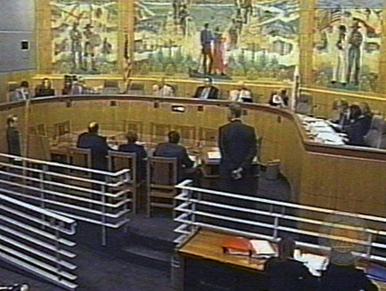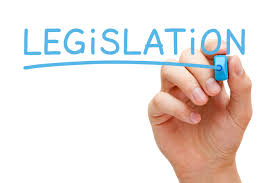2004 Legislation
-
Bill Asks Legislators to Limit Police Pursuits
-
The following article is about Kristie's Law when it was proposed in 2004.
"Kristie's Law" was a proposed measure in 2004-05 that did not pass here in California. It would have corrected California's immunity shield for law enforcement that grants immunity even when the pursuit policy is not followed. It also advocated the need for a statewide pursuit policy that would have limited vehicular police pursuits to violent crimes when there is no other way to apprehend the suspect(s).
California has one specific area of law that is unique among the 50 states. California Vehicle Code Section 17004.7 provides immunity to law enforcement for injury to and death of innocent bystanders even when officers do not follow the vehicular pursuit policy their agency has actually adopted. There is no accountability to innocent victims and the families left behind.
Became law in 2007: Vehicle Code Section 17004.7 goes on and on, but nowhere in this code does it say officers must follow their pursuit policy. Read carefully, there's even an escape clause regarding the requirement for officers to read their pursuit policy. Vehicle Code 17004.7 (b) (2) reads as follows: "The failure of an individual officer to sign a certification shall not be used to impose liability on an individual officer or a public entity."
Was California's law from 1987 to 2006: Vehicle Code Section 17004.7.
You might want to read: Not So Black and White.
Kristie's Bill Introduced in California
On February 20, 2004—Republican State Senator Sam Aanestad introduced SB 1866, known as Kristie’s Law after Kristie Priano, a Chico, California teenager who was the innocent victim of a Chico Police Department pursuit, January 22, 2002. Kristie’s parents, Mark and Candy, have worked hard for this bill since those tragic events. They have spoken to groups, civilian and law enforcement, all over California, have made numerous media appearances, locally and nationally and maintain this website, kristieslaw.org. The hard work had paid off with the introduction of Senator Aanestad’s bill. Committee hearings were scheduled to begin April 13, 2004. The bill set a minimum standard for pursuit policy/practice and offers immunity from financial liability to departments who meet and follow the standard. Currently California law grants blanket immunity to agencies if they have a policy. There is no minimum standard—nor do they have to follow the policy to be immune. The bill is a giant leap forward for the State of California and should be embraced by its citizens and law enforcement professionals. Accountability should never be feared—it is critical to good government.
The hearing for Kristie's Law (SB 1866) took place in front of the California Senate Public Safety Committee on Tuesday, April 13, 2004. After the introduction of the bill by Sen. Aanestad and testimony by Mark and Candy Priano and Jim Phillips of PursuitWatch.org, the opponents of the bill were given the opportunity to express themselves. A host of law enforcement representatives stepped to the witness table. After a self-serving statement from the first opponent of the bill about he was moved to tears by the Priano's story, he launched into a litany of often discredited clichés about why the police need wide discretion in pursuit policy.
Passed Public Safety Committee: Kristie's Law passed the Public Safety Committee today 4-yes votes, 1 no and 1 abstention. (4/20/04)
Voted Down in Judiciary: Kristie's Law met with unexpected resistance in the Judiciary Committee and was not passed out of committee with a vote of 3-yes, 1-no and 3 abstention. the bill was then granted reconsideration by the committee (6-0-1) and will be heard by the committee as
on Tuesday May 4th.
Resources
2002-2004
• Appellate Court describes California's pursuit immunity shield as a "Get out of liability free card"
• SB 1866 Introduced
• SB 1866 Amended
• SB 1866 Judiciary Analyses
• Jim Phillips letter to Sen. Aanestad supporting Kristie's Law
• Mark and Candy Priano's letter of support to Sen. Aanestad
• The "no-pursuit" policy lie, by Jim Phillips, PursuitWatch
• Mark Priano testimony
• Candy Priano testimony
• Jim Phillips testimony
Kristie's law required officers to follow their agency's pursuit policy
for their employer to receive immunity from liability.
Media coverage from the Chico Enterprise-Record
"Aanestad to work with police to create 'Kristie's Law' that will pass Legislature" (Romero's SB 219 passes Senate; unfortunately for Californians, SB 219 will fail to pass the Assembly) June 5, 2003
April 13, 2004 & April 14, 2004
"Police Pursuit Bill Passes Senate Committee," April 21, 2004
"Chico's Chief Supports Existing Policy" (Opposes Kristie's Law) April 24, 2004
"Experts: Chico Pursuit Policy Outdated," April 24, 2004
"Kristie's Bill blocked in Senate Judiciary Committee," April 28, 2004
"Kristie's Law gets second chance," May 3, 2004
"Down again: Kristie's Law' comes up short before the Judiciary Committee," May 5, 2004
"Aanestad bravely strikes out on his own," David Little, Editorial, May 30, 2004
Other media coverage
"Proposed Law Would Limit Police Chases," Los Angeles Times, April 12, 2004
"Senate committee ponders limiting chases" Modesto Bee, April 13, 2004
"Grieving parents ask limits on chase," Sacramento Bee, April 14, 2004
"Bill puts limits on police pursuits," Fresno Bee, April 14, 2004
"Bill Asks Legislators to Limit Police Pursuits," KESQ News, Channel 3, April 12, 2004
"California Law Aims to Limit Police Chases," LA Fox News Channel, April 14, 2004
"Bill imposes statewide pursuit policy" (Notes fewer injuries) Associated Press, April 20, 2004
"Big Boys With Big Toys," Ventura County Star, 2002
"Limits on police chases sought," Redding Searchlight, May 1, 2004
"Speak Your Piece," by Senator Sam Aanestad, May 12, 2004
'Kristie’s Bill' Senate Hearing April 13, 2004
The hearing for Kristie's Law (SB 1866) took place in front of the California Senate Public Safety Committee on Tuesday, April 13. After the introduction of the bill by Sen. Aanestad and testimony by Mark and Candy Priano and myself the opponents of the bill were given the opportunity to express themselves. A host of Law Enforcement representatives stepped to the witness table. After a self-serving statement from the first opponent of the bill about he was moved to tears by the Prianos' story he launched into a litany of often discredited clichés about why the police need wide discretion in pursuit policy.
-The bill holds law enforcement accountable for actions of the suspect. The old "if the bad
guys hadn't run defense. To believe this you must believe that the police must chase the
suspect no matter what-through a school zone i.e., and have no choices in what they do.
-The "body in the trunk" theory. That every suspect who flees has committed a heinous
crime. Research shows that only about 10-17% of the time is there a serious underlying
crime.
-That by pursuing they prevent untold future crimes by the suspects. Why not arrest us all
and prevent all future crime?
-Implying that they may never have another opportunity to catch the criminal and put him
away. Habitual lawbreakers and dangerous career criminals interact with the police on a
regular basis. They are not masterminds and they will be caught in due time. Additionally,
pursuit is not the only tool available to police.
-If they know we won't chase everyone will run. Experience has shown that when pursuit
policy is changed the number of suspects who flee remains fairly constant. Those who will
flee, flee whatever the policy.
-Making fleeing and eluding a serious felony with serious penalties will stop pursuits. It will
discourage some pursuits and most supporters of SB 1866 support such legislation. It will
not stop most pursuits and is not a substitute for good policy. It should be noted that
seriously disproportionate penalties may actually serve to make pursuits more dangerous
when a driver decides to flee in a momentary lapse in judgment is pushed to continue
the pursuit because of the well-publicized harsh penalty.
-Policy has to be discretionary so that police officers have the ability to handle a wide array
of pursuit situations. Most of the decisions concerning pursuits can be made in policy and
training (see The Myth of the Split-Second Decision) and the danger of making decisions
in the midst of an an adrenaline overload is documented here.
-The huge cost of law suits to the taxpayers and individual officers would force police
officers to never pursue. The easy answer is that if the agencies follow their policy and
the policy meets minimum standards then there is still Blanket Immunity. In the real world
there will be instances where poor judgment, sloppy training, or lapsed individual
accountability will lead to liability. It is just as certain that if financial liability is the result of
this poor judgment, sloppy training, or lapsed individual accountability and that
departments will work hard avoid that liability and that individual officers will carefully
consider their actions. Liability is the mechanism of accountability. Accountability is as
critical to good government as personal responsibility is to being a good citizen.
The witness followed with a statement of how law enforcement was willing to work with the legislature to address any problems or questions they had with pursuits. After a second witness restated the same weak arguments and began to talk about how Law Enforcement would like to cooperate, Senator Gloria Romero broke in and related how a much less restrictive bill she introduced in 2003 was "stonewalled" by law enforcement despite repeated attempts to obtain their feedback and suggestions. She observed that the witnesses' statements of law enforcement cooperation were disingenuous at best. She further stated that there was no need
for the 6 to 7 remaining opposition witnesses to rehash the previously stated testimony. The next witness proposed a special fund, supported by insurance or tax dollars, to compensate victims. Senator Byron Sher remarked that the witnesses just didn't understand what this was all about. "It is not about compensation—it is about preventing needless deaths." After a few quick statements of non-support for the bill from more agencies and Law Enforcement organizations, including the California Attorney General, a representative of the Risk Management Pool spoke of the dire consequences of lifting Blanket Immunity-even in clearly defined circumstances.
After discussion and recommendations on the legal aspects of the bill, particularly about shielding individual officers from liability except in cases of gross misconduct. Senator Aanestad agreed that the concerns about individual liability were valid and should be addressed. The bill was held in committee until a vote on Tuesday, April 20th because of the absence of 2 of the committee members. It is anticipated that the bill will pass the committee and move to the Judiciary Committee.
Jim Phillips
4/17/2004
Senator Sam Aanestad holds the first senate hearing on "Kristie's Law" in 2004
 Senate Public Safety Hearing on "Kristie's Law." Senator Aanestad is at the lectern. From left seated are Jim Phillips, Candy and Mark Priano.
Senate Public Safety Hearing on "Kristie's Law." Senator Aanestad is at the lectern. From left seated are Jim Phillips, Candy and Mark Priano.
Just introducing the measure, Kristie's Law, had prompted threats of political retaliation against state Senator Sam Aanestad, R-Grass Valley, whose vast district extends from the college town of Chico to Redding and the Oregon border.
Maready, a Redding detective, said he might form a coalition of police unions and work to unseat Aanestad in 2006.
"We would actively oppose his re-election if this were to carry on. He might see that district-wide," Maready said.
Aanestad's reaction: "I don't care. This is the right thing to do."
"Proposed Law Would Limit Police Chases," Los Angeles Times,
April 12, 2004
Scott Adsit of San Francisco on his wedding day. A year later, Scott, a construction worker, was loading tools in his pickup truck when he was killed by a suspected car thief who was fleeing from the police.

California legislators need to put forth meaningful legislation that will minimize the dangers of police vehicular pursuits to the public and police officers. For more than several decades our State legislators have been unable, or perhaps unwilling, to pass legislation to update California's outdated and dangerous pursuit laws.
In The News
The Berkeley Daily Planet: Priano family continues fight for chase limits ... One of the most active campaigns in both California and the nation to put stricter limits on police pursuits is being conducted by the mother of Kristie Priano, the 15-year-old Chico girl who was killed ....
Richmond Times-Dispatch: After deaths of Petersburg couple, more loss: loss of trust
"The idea that the people you trusted were involved in the death of your loved one adds another type of loss: the loss of trust in someone you thought would keep you safe," Candy Priano said.
The Chronicle-Telegram: Police: Chases looked at by case
"We do believe fleeing drivers should be caught," Priano said. "But we also don't believe innocent lives should be put at risk."








